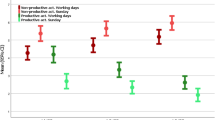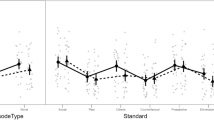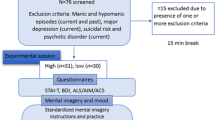Abstract
Objective:
To assess the quality of positive and negative affect (mood) in an ageing European sample.
Background:
Mood quality has important implications for both physical and mental wellbeing. Poor quality moods are associated with deficits in the diverse areas of cognitive function, health, and social relationships. The ageing process presents a number of potential challenges to successful mood regulation that could have wider implications.
Design and participants:
The current study examines the quality of positive and negative affect in 387 healthy participants from three European countries. Moods were measured four times a day for 4–7 d with the Positive and Negative Affect Schedule (PANAS) mood scales. Measures of zinc (Zn) status were taken also.
Setting:
Two centres concentrated on 55–70 yr olds (Coleraine, N.Ireland, n=93 and Clermont-Ferrand, France, n=95), and two centres concentrated on 70–87 yr olds (Rome, Italy, n=108, and Grenoble, France, n=91).
Results:
Positive affect scores for the centre in Rome were significantly (P<0.01) lower than for the other three centres, and the Grenoble centre had significantly (P<0.05) higher scores on negative affect than the other three centres. Mood was not related to measures of zinc status (all Ps>0.05).
Conclusions:
The two centres with the oldest participants showed deficits in mood quality that may have implications for broader well-being.
Sponsorship:
The ZENITH study is supported by the European Commission ‘Quality of Life and Management of Living Resources’ Fifth Framework Programme, Contract no. QLK1-CT-2001-00168.
This is a preview of subscription content, access via your institution
Access options
Subscribe to this journal
Receive 12 print issues and online access
$259.00 per year
only $21.58 per issue
Buy this article
- Purchase on Springer Link
- Instant access to full article PDF
Prices may be subject to local taxes which are calculated during checkout
Similar content being viewed by others
References
Andriollo-Sanchez M, Hininger-Favier I, Meunier N, Toti E, Zaccaria M, Brandollini-Bunlon M, Polito A, O’Connor JM, Ferry M, Coudray C & Roussel AM (2005): Zinc intake and status in middle-aged and older European subjects. The Zenith study. Eur. J. Clin. Nutr. 59, S37–S41.
Hill RD, van Boxtel MPJ, Ponds R, Houx PJ & Jolles J (2005): Positive affect and its relationship to free recall memory performance in a sample of older Dutch adults from the Maastricht aging study. Int. J. Geriatr. Psychiatry 20, 429–435.
Maes M, Vandoolaeghe E, Neels H, Demedts P, Wauters A, Meltzer HY, Altamura C & Desnyder R (1997): Lower serum zinc in major depression is a sensitive marker. Biol. Psyc. 42, 349–358.
McConville C & Cooper C (1997): The temporal stability of mood variability. Person Individ. Diff. 23, 161–164.
Mineka S, Watson D & Clark LA (1998): Comorbidity of anxiety and unipolar mood disorders. Ann. Rev. Psychol. 49, 377–412.
Nowak G, Siwek M, Dudek D, Zieba A & Pilc A (2003): Effects of zinc supplementation on antidepressant therapy in unipolar depression: A preliminary placebo-controlled study. Pol. J. Pharmacol. 55, 1143–1147.
Ostir GV, Ottenbacher KJ & Markides KS (2004): Onset of frailty in older adults and the protective role of positive affect. Psychol. Aging 19, 402–408.
Pettit JW, Kline JP, Gencoz T, Gencoz F & Joiner TE (2001): Are happy people healthier? The specific role of positive affect in predicting self-reported health symptoms. J. Res. Pers. 35, 521–536.
Polito A, Meunier N, Andriollo-Sanchez M, Catasta G, Azzini E, Simpson EEA, O’Connor JM, Roussel AM, Ferry M, Coudray C & Maiani G (2005): Screening and recruitment procedure of late-middle aged and older subjects. Eur. J. Clin. Nutr. 59, S8–S12.
Robins W, Trzesniewski KH, Tracy JL, Gosling SD & Potter J (2002): Global self-esteem across the life-span. Psychol. Aging 17, 423–434.
Terracciano A, McCrae RR & Costa PT (2003): Factorial and construct validity of the Italian Positive and Negative Affect Schedule (PANAS). Eur. J. Psychol. Assess. 19, 131–141.
Watson D & Clark LA (1994): The PANAS-X: manual for the Positive and Negative Affect Schedule – expanded form. IA,USA: The University of Iowa.
Watson D, Clark LA & Tellegen A (1988): Development and validation of brief measures of positive and negative affect: the PANAS scales. J. Pers. Soc. Psychol. 54, 1063–1070.
Westerbotn M, Agüero-Torres H, Fastbom J & Hillerås P (2005): A population-based study on well-being in the very old: the role of cardiovascular diseases and drugs. Arch. Gerontol. Geriat. 40, 287–297.
Author information
Authors and Affiliations
Corresponding author
Additional information
Guarantor: C McConville.
Contributors: CM took the lead in writing the report, and carried out the statistical analysis. EEAS, BSK and GR helped develop the methodology and interpret the results. LS collected data in NI and prepared all data for analysis. JOC supervised the NI data collection. MA and NM were responsible for collecting the French data. AMR and CC supervised the collection of the French data and contributed to the protocol of the study and the management of the data collection. AP is responsible for INRAN, and MC is the Italian supervisor for psychological tests. All the authors made a critical revision of the original draft.
Rights and permissions
About this article
This article is cited by
-
Efficacy of Fasting and Calorie Restriction (FCR) on mood and depression among ageing men
The Journal of nutrition, health and aging (2013)
-
Zinc status, psychological and nutritional assessment in old people recruited in five European countries: Zincage study
Biogerontology (2006)
-
Introduction to the ZENITH study and summary of baseline results
European Journal of Clinical Nutrition (2005)



